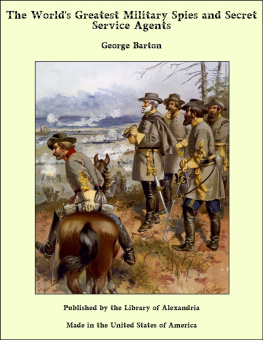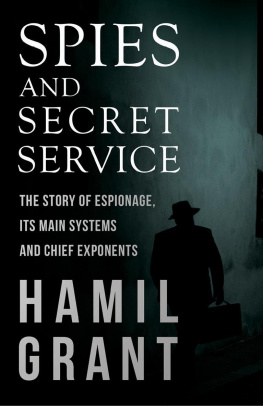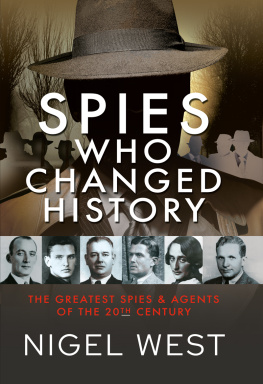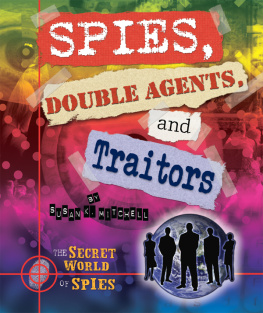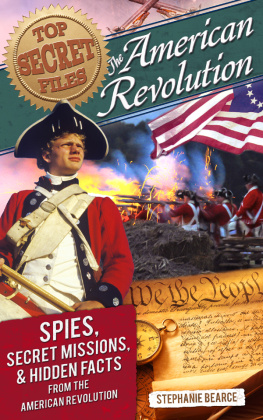INTRODUCTION
The romance of war in its most thrilling form is exemplified in this narrative of the adventures of The Worlds Greatest Military Spies and Secret Service Agents. Much has been published upon the subject of espionage, and the memoirs and secret histories of the courts of Europe give us instances of men and women who have gained favor and money, if not honor and glory, by selling back-stairs gossip concerning their fellow creatures; but the aim of the present work has been rather to relate the big exploits of those who faced great personal danger and risked their lives for the sake of flag and country.
Each story is complete in itself, and yet forms a link in the chain of narratives which illustrates the startling and unexpected manner in which battles have been lost and won through the shrewdness and the courage of military spies at various times in different countries of the world. All spies are not admirable. Indeed, some whose deeds are herein related seem despicable. The use of the word spy in this series is in its broadest, and usually its best, sense. In all of the great wars of history there have been spies, scouts, emissaries and others still with no very well defined status, who have rendered invaluable service to their governments. A spy is liable to death; a scout, if captured, has the rights of a prisoner of war, but an emissary is rather political than military, and is sent to influence secretly the opposition rather than to bring information concerning the movements of troops.
There are spies and spies. Just where the line is to be drawn must depend largely upon the personal view-point of the reader. Some of those who have been engaged in hazardous military exploits are looked upon as among the worlds greatest heroes; others who have abused the hospitality of their entertainers in order to betray them have earned never-ending obloquy. Everything depends upon the circumstances and the point of view. Human nature has been the same in all ages. We are disposed to justify and glorify the military spy who risks his life for our own country and our own cause, and to condemn and abuse the one who is enlisted in the service of the enemy.
Generally speaking, there is a natural repugnance to the professional spy in times of war, who is regarded as akin to the paid informer in times of peace. But the tendency is to applaud the real soldier who is willing to depart from the strict lines of military duty in order to serve his country. Napoleon, who can scarcely be called a scrupulous man, even by his most ardent admirers, refused to bestow the medal of honor on his chief spy. Money, as much as you like, he exclaimed, but the crossnever!
At the time of the capture of Emilio Aguinaldo by the late Brigadier-General Frederick Funston a question arose regarding the ethics of the means employed by some of the members of the troops under his command on that occasion. It arose in a lecture before the law class at the University of the Philippines. Justice Carson, of the Supreme Court, was asked to enlighten the students on this point. Instead of doing so, he wrote and asked General Funstons view of the matter. The reply of the American soldier may be accepted as the authorized military view of the question. General Funston wrote:
In a nutshell, the legal status of all those engaged in the expedition referred to was that of spies, and as such they could not have claimed immunity from the usual fate of spies. While we were not disguised for the purpose of obtaining information, the fact that we penetrated the enemys lines under false colors would have justified treating us as such.
Having acknowledged that our status was that of Spies, I wish to call attention to a popular, erroneous belief that spies are violators of the laws of war simply because they are spies and in disguise. It is safe to say that there never has been a war in which both sides did not use spies; in fact, the principal military nations use them in time of peace. Spies are punished, not because there is anything morally reprehensible in their work, but because it is desired to make their occupations so dangerous that it will be difficult to find men to undertake the risks involved.
The status of the spy in our own history cannot better be shown than in the fact that Nathan Hale, the spy of our own Revolution, whose impressive statue stands in New York and whose last words on the gallows were: My chief regret is that I have but one life to give for my country, is one of the greatest of our national heroes.
Washington has been regarded always as one of the most scrupulous of men, but he did not hesitate to hold as a prisoner the British general Prescott, captured by Colonel Barton of the Rhode Island militia and a few men, all disguised as non-combatants, who penetrated the British lines under false colors.
Although the use of spies is not a violation of the laws of war, there are certain acts that are recognized as such and may be punished by death: The violation of the flag of truce; breaking a truce; violation of parole; the use of poison; killing of prisoners of war to prevent their recapture, and hoisting the hospital flag over a place not a hospital. But all these imply moral obliquity, and I have never heard of any one being rewarded or having a monument erected to him for having been guilty of any one of them.
The Filipinos are about the last people in the world who can question the ethics of entering the enemys lines in disguise. As a veteran of the war you know that, disguised as non-combatants, their officers and soldiers are among us all the time, and that if we had enforced the law strictly relative to spies we would have been hanging men all the time.
The halo of romance hovers in a special manner over women spies, and it is interesting to note that the United States furnishes the most conspicuous examples of this class in the persons of Belle Boyd, the Confederate girl who saved Stonewall Jackson; and Emma Edmonds, the Union spy, whose adventures could scarcely be duplicated in the pages of fiction. The story of a third American woman is related in this volumeLydia Darrah, the gentle and brave Quakeress who saved Washingtons army from destruction. She was not a spy in the accepted sense of the word, and it would be impossible to imagine a greater contrast than is presented between the colonial girl and the two women of the Civil War, but the service she rendered the young and struggling nation cannot be overestimated.
A book of this character would not be complete without the stories of Nathan Hale and Major Andr, the American and the Briton, each young and gallant, and each giving up his life for his country. In a general way, their exploits are familiar, yet it may be found that a new light has been turned upon certain phases of the sacrifices which they both so cheerfully made for the causes they represented.
An effort has been made to confine this work to the operations of military spies, but in possibly two instances the rule has been relaxed in order to present phases of that form of diplomacy which is so closely allied with war as to be part of it. Most of the incidents are interwoven with the history of the countries to which they relate, and are part of the archives of the State, War and Navy Departments of these nations. Taken all in all, the pages of fiction contain few things more fascinating or thrilling than these fact stories.

